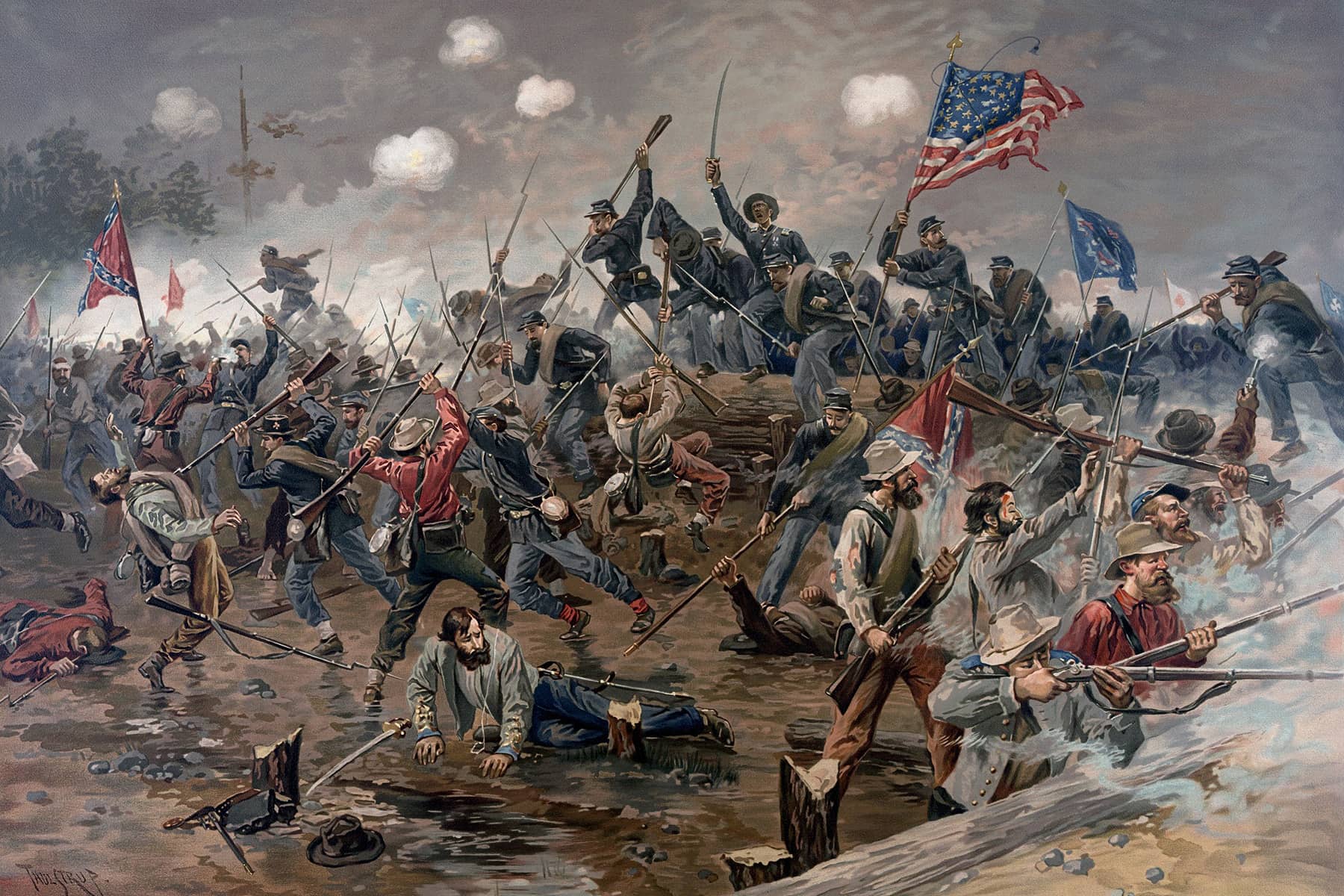
On February 1, 1862, in the early days of the Civil War, the “Atlantic Monthly” published Julia Ward Howe’s “Battle Hymn of the Republic,” summing up the cause of freedom for which the United States troops would soon be fighting.
“Mine eyes have seen the glory of the coming of the Lord,” it began.
“He is trampling out the vintage where the grapes of wrath are stored; He hath loosed the fateful lightning of His terrible swift sword: His truth is marching on.”
Howe had written the poem on a visit to Washington with her husband. Approaching the city, she had reflected sadly that there was little she could do for the United States. She could not send her menfolk: her husband was too old to fight, her sons too young. And with a toddler, she didn’t even have enough time to volunteer to pack stores for the field hospitals.
“I thought of the women of my acquaintance whose sons or husbands were fighting our great battle; the women themselves serving in the hospitals, or busying themselves with the work of the Sanitary Commission,” and felt there was nothing she could give to the cause.
One day she and her husband toured the troops surrounding the city and, mingling with troops on the way home, sang a popular song: “John Brown’s body lies a-mouldering in the grave; his soul is marching on.” A friend challenged Howe to write more uplifting words for the marching song.
That night, Howe slept soundly. She woke before dawn and, lying in bed, began thinking about the tune she had heard the soldiers singing the day before. She recalled: “[A]s I lay waiting for the dawn, the long lines of the desired poem began to twine themselves in my mind … With a sudden effort, I sprang out of bed, and found in the dimness an old stump of a pen … I scrawled the verses almost without looking at the paper.”
Howe’s hymn captured the tension of Washington DC, during the war as soldiers protected the government from invasion, strung in camps around the city to keep invaders from the U.S. Capitol.
“I have seen Him in the watch-fires of a hundred circling camps,
They have builded Him an altar in the evening dews and damps;
I can read His righteous sentence by the dim and flaring lamps:
His day is marching on.”
Howe’s Battle Hymn of the Republic went on define the Civil War as a holy war for human freedom:
“In the beauty of the lilies Christ was born across the sea,
With a glory in His bosom that transfigures you and me.
As He died to make men holy, let us die to make men free,
While God is marching on.”
The Battle Hymn became the anthem of the Union during the Civil War, and exactly three years after it appeared in the Atlantic Monthly, on February 1, 1865, President Abraham Lincoln signed the Joint Resolution of Congress passing the Thirteenth Amendment and sending it off to the states for ratification.
The amendment provided that “Neither slavery nor involuntary servitude, except as a punishment for crime whereof the party shall have been duly convicted, shall exist within the United States, or any place subject to their jurisdiction.” It gave Congress power to enforce that amendment. This was the first amendment that gave power to the federal government rather than taking it away. Three quarters of the states had ratified the Thirteenth Amendment by December 6, 1865.
When the measure had passed the House the day before, the lawmakers and spectators had gone wild. “The members on the floor huzzaed in chorus with deafening and equally emphatic cheers of the throng in the galleries,” the “New York Times” reported. “The ladies in the dense assemblage waved their handkerchiefs, and again and again the applause was repeated, intermingled with clapping of hands and exclamations of ‘Hurrah for freedom,’ ‘Glory enough for one day.’ The audience were wildly excited, and the friends of the measure were jubilant.”
Indiana congressman George Julian later recalled, “It seemed to me I had been born into a new life, and that the world was overflowing with beauty and joy, while I was inexpressibly thankful for the privilege of recording my name on so glorious a page of the nation’s history.”
But the hopes of that moment had crumbled within a decade. Almost a century later, on February 1, 1960, David Richmond, Franklin McCain, Ezell A. Blair Jr., and Joseph McNeil set out to bring them back to life when they sat down on stools at the F.W. Woolworth Company department store lunch counter in Greensboro, North Carolina. The men were first-year students at North Carolina Agricultural and Technical State University who wanted to find a way to combat the segregation under which Black Americans had lived since the 1880s.
Woolworth’s would sell products to Black students but would not serve them food. So the men forced the issue by sitting down and ordering coffee and doughnuts. They sat quietly as the White waitress refused to serve them and the store manager ignored them. They came back the next day with a larger group. This time, television cameras covered the story. By February 3 there were 60 men and women sitting. By February 5 there were 50 White male counter-protesters.
By March the sit-in movement had spread across the South, to bus routes, museums, art galleries, and swimming pools. In July, after profits had dropped dramatically, the store manager of the Greensboro Woolworth’s asked four Black employees to put on street clothes and order food at the counter. They did, and they were served. Desegregation in public spaces had begun.
Exactly 63 years later, on February 1, 2023, Tyre Nichols’s family said laid their 29-year-old son to rest in Memphis, Tennessee. He was so severely beaten by police officers on January 7, allegedly for a traffic violation, that he died three days later.
Also on February 1, 2023, the College Board released the official curriculum for a new Advanced Placement course in African American Studies. In January, right-wing Florida governor Ron DeSantis complained that the draft course was “indoctrination” and “lacks educational value and is contrary to Florida law,” and said he would ban it. The version released has been stripped of information about Black feminism, the queer experience, incarceration, and the Black Lives Matter movement.
Mine eyes have seen the glory.
Rest in power, Mr. Nichols.
Thure de Thulstrup / Library of Congress
Letters from an Аmerican is a daily email newsletter written by Heather Cox Richardson, about the history behind today’s politics














